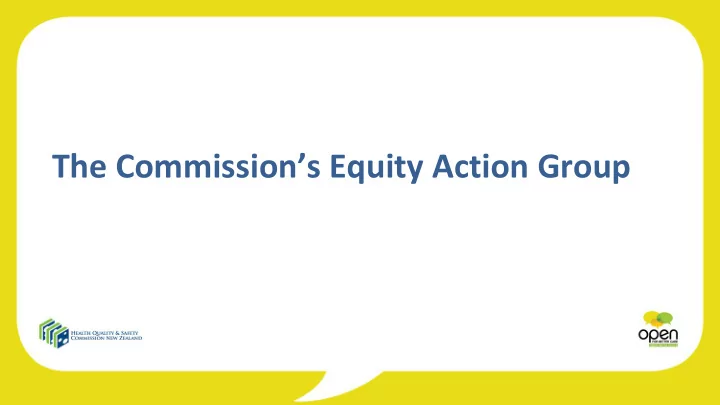

The Commission’s Equity Action Group
Who are we? • Meet for an hour every fortnight- 24 hours or 3 working days • Exchange whats going on in each program • Feedback on developments eg Equity view • Discuss challenges • Started to think about how we can help embed equity into everyone’s thinking so that it becomes business as usual
Mana taurite hauora: Health equity for all We have a vision of an Aotearoa New Zealand where no avoidable, unfair or unjust health inequities exist that are based on differences in ethnicity, socio-economic circumstances, geography, gender, sexuality, age, specific health conditions or disabilities, or combinations of these
The 2017 Plan set the vision for 2017 to 21, as follows: The Health Quality & Safety Commission (the Commission) believes there is no quality without equity in health care. It acknowledges equity as one of the core dimensions in the definition of quality. The Commission aims to show authentic commitment to health equity in all its processes, activities and outputs.
The Health Equity Assessment Tool (HEAT) Signal, L., Martin, J., Cram, F., and Robson, B. The Health Equity Assessment Tool: A user’s guide. 2008. Wellington: Ministry of Health
HEAT Questions: 1. What inequalities exist in relation to the health issue under consideration? 2. Who is most advantaged and how? 3. How did the inequalities occur? What are the mechanisms by which the inequalities were created, maintained or increased? 4. Where/how will you intervene to tackle this issue? 5. How will you improve Māori health outcomes and reduce health inequalities experienced by Māori?
HEAT Questions: 6. How could this intervention affect health inequalities? 7. Who will benefit most? 8. What might the unintended consequences be? 9. What will you do to make sure the intervention does reduce inequalities? 10. How will you know if inequalities have been reduced?
Kapasa training • Staff in Auckland and Wellington
Patient safety week Improving communication by understanding unconscious bias in health care • Raise clinicians’ awareness of unconscious bias – how it impacts their communications, – to enhance appropriate communication with Māori and other population groups • Encourage clinicians to undertake further clinical communications education Call to action – Watch the unconscious bias and communication education and training videos – Undertake further learning about culturally competent communications and unconscious bias
Next piece of work is a checklist for all programs • Prioritising -HEAT, Kapasa, our strategic priorities • Planning • Project phase • Evaluation • Report writing and peer review • Papers to CAG, Te Rōpū prior to the Board
Keen to get your input and ideas
Questions?
Recommend
More recommend